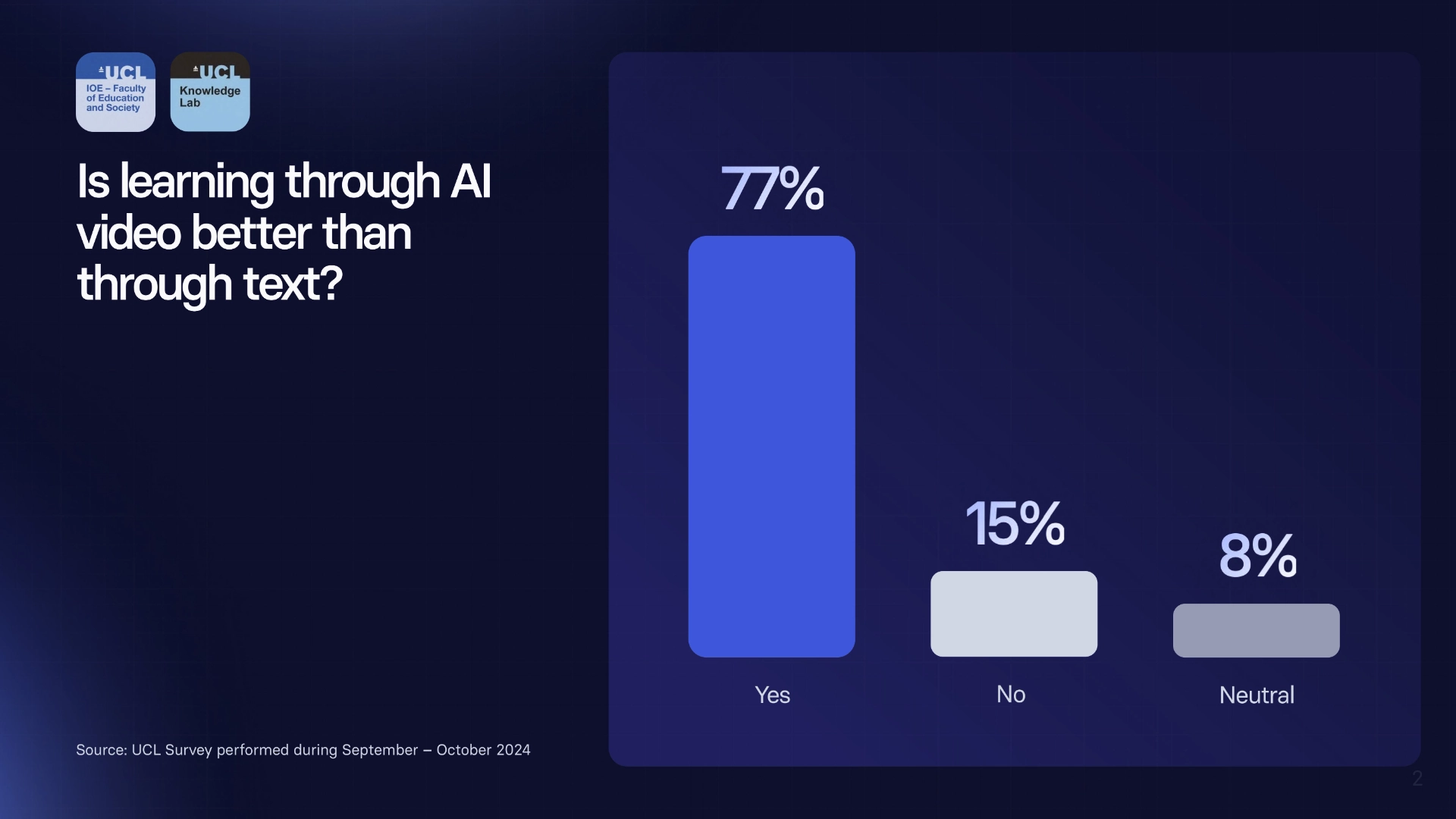

Turn your texts, PPTs, PDFs or URLs to video - in minutes.

Selling takes building relationships, as consumers buy from those they know, like, and trust. But who has time for it?
On one hand, sales managers are dealing with spreadsheets overflowing with leads, reports that take hours to decipher, and that nagging feeling they're missing qualified prospects.
On the other, sales reps are stretched thin, juggling calls and emails and chasing down leads that might not be a good fit.
AI for sales can help you streamline the entire sales process. So you can free up your reps' time and empower them to close more deals.
In this blog post, we'll show you all the different uses of AI in sales and some cool AI sales tools. Read on to discover how to make your sales team focus on qualified conversations, not data drudgery.
How is AI useful in sales?
AI helps sales reps work more effectively, adapt to changing market trends, and reach their quotas more easily. With the right AI tools, salespeople can sift through data faster and with fewer mistakes. They also identify hot leads and gain intel on how to talk to them for maximum impact.
But this tech doesn't just streamline research and make your sales processes more efficient; it personalizes the sales journey at scale. With valuable AI insights, salespeople can craft pitches that truly resonate and show offers that spark your clients' eyes. Even better, AI can create custom templates and fill in entire sale scripts in seconds. Your agents take these custom scripts and approach clients, making every interaction tailor-made.
Beyond efficiency and client-centric communication, AI also plays a coaching role. It fast-tracks onboarding, personalizes training, and offers real-time feedback. In short, AI can make your sales team stronger and smarter every day.
How will AI impact sales?
AI sales technology will not replace salespeople (at least not for the next decade!) because it can't replicate the genuine rapport, connection, and intuition that humans bring to the table. Instead, its the ultimate assistant, crunching numbers, spotting patterns, and handling the repetitive sales tasks.
AI technology identifies leads, schedules appointments, and handles other tedious tasks like data entry and analysis. Human salespeople focus on high-value tasks that really move the needle, like strategizing deals and nurturing client relationships. It's like returning to the good old days of sales when relationships were king.
So, rather than taking jobs, AI makes sales jobs more rewarding and focused on genuine human connections.
For artificial intelligence to be fully effective, companies must focus on:
- Adapting workflows and roles to new AI-driven possibilities
- Ensuring technology enhances human work rather than replacing it
This Bloomberg video below will give you some cool insights on how AI tools are changing the sales world:
Use 1: Create sales training videos for your teams
Learners are 75% more likely to watch videos than to study resources in other formats. Once they do it, they also retain 85% more than they do from text training. So, if you want to enhance learning, improve product understanding, and increase your sales teams' engagement, use AI to create two different types of training videos:
- Sales enablement videos that educate your agents on the nuances of your products and services. These will prepare them to better explain benefits and applications, handle objections, or suggest competitive differentiation in client interactions.
- Sales training videos for teaching your reps specific sales techniques or soft skills like communication practices, emotional intelligence, active listening, etc.
Synthesia, for instance, is a text-to-video tool that can generate talking-head videos from plain text in minutes. Below is an example of an AI sales training video on remote selling skills. The presenter is an AI avatar, a digital double of a real actor, but you can also create custom avatars of your sales leaders to use familiar faces in your AI videos.
Don’t have the time or don’t want to write video scripts? The 'Generate video with AI' function will write you a script broken down into scenes with a professional video template. Customize your generative AI video with brand assets and footage, use it as is, or create multiple versions in different languages and with different script adjustments.
Pictory is another AI tool for creating short videos from longer content. It’s great for summarizing client discussions and turning them into videos your sales agents can learn from.
Alternatively, you can try Sendspark, which shoots one video and then automatically personalizes it for each new viewer with AI.
Use 2: Create sales enablement resources
Sales enablement resources can be anything that increases the efficiency and effectiveness of the sale process — videos, lead magnets (ebooks, industry reports, whitepapers, personalized PDFs, etc.), or interactive tools (quizzes, calculators, configurators that give prospects personalized information and recommendations).
Here’s a video example that introduces a new product to the sales teams:
Aside from creating resources for your agents, you can create product demo videos, success stories, customer testimonials, etc., to educate and persuade potential buyers.
But why focus so much on video resources? Because 64% of customers purchase after watching videos. Plus, the enjoyment of video ads increases purchase intent by 97% and brand association by 139%. In short, these videos are highly effective, and the case study below also proves that AI can make them even more effective.
Other than Synthesia for sales enablement videos, you can use Canva to design your lead magnets, Creativio AI for studio-quality AI product photos, or Taskade to generate all sorts of lead magnets with AI.
Use 3: Get sales intelligence data automatically
Sales intelligence is information you gather and analyze to better understand your potential customers. It includes contact information, company background, decision-makers, purchasing behavior, and needs. When you feed your sales agents this information, you open the door to increased efficiency, informed sales strategies, and even competitive advantage.
Salespeople need data. Use AI and machine learning tools to scour the web for relevant information about your potential customers. To make your work easier, integrate AI tools with your CRM data and set up systems to receive real-time alerts and updates about key changes, news about prospects, etc.
Not sure what AI tools to use to get sales intelligence data automatically? Try some sales AI tools like:
- Hunter.io to find email addresses in seconds.
- Seamless.ai to find verified cell phones, emails, and direct dials of anyone you need to sell to. It also includes an AI writer for optimized cold outreach.
- Apollo.io to scour through data on 275M contacts and 65M accounts.
Use 4: Automate lead qualification and prioritization
Data doesn't equal sales, which is why sales teams only want to talk to potential customers who are the best fit. However, AI technology helps any rep or sales manager deal with one of their biggest challenges: qualifying leads. Using AI to automate lead qualification and prioritization will save you time, increase efficiency, and ensure your efforts focus on the leads most likely to convert into buyers.
Use AI tools and algorithms to improve the sales process and score leads based on their interaction with your business. These algorithms will do repetitive tasks and analyze data points such as website visits, email engagements, and social media interactions.
Check out Salesforce Einstein for predictive scoring and Forwrd.ai for lead scoring based on user behavior. And if you’re not quite sure about the differences between the old, rule-based way of scouring leads and the new, AI-powered way, watch this video by Forwrd.ai:
Use 5: Improve pipeline management and move leads through the funnel
Pipeline management identifies where your prospects are in the sales cycle, forecasts future sales, and allocates resources more effectively. Managing your pipeline with AI enhances revenue intelligence. You’re not just identifying high-quality leads and forecasting sales but actually managing those leads through each stage of the sales cycle. In short, AI can help you make smarter, data-driven decisions.
Benefits include more accurate sales forecasts, improved resource allocation, and identification of potential bottlenecks in your sales process. If you’re wondering how to get all that, consider implementing AI systems to:
- Score leads based on the likelihood of converting.
- Dynamically segment those leads based on their changing behaviors and patterns.
- Predict deals with historical data analysis and ongoing deal interactions like email exchanges, call notes, engagement metrics, etc.
- Get next-step recommendations taking bottlenecks into account.
Look into AI tools like Zoho CRM or RELEX for AI-powered sales forecasting, Clari for pipeline management and revenue forecasting, or Pipedrive for AI-sales assistance.
Use 6: Personalize sales content
With 9 in 10 sales professionals saying customers expect some personalized content, personalization is more likely to strengthen customer relationships and win you the sale. This is especially true in B2B, where 77% of buyers won’t purchase without personalized content. So, to increase engagement and conversion rates, you’ve got to use AI sales technology to tailor any communication form you can.
Leverage AI to analyze customer data and create personalized outreach materials. These include emails, presentations, and proposals, based on the prospect’s interests and behaviors.
Adobe Marketo offers some AI tools for dynamic content personalization, and Outreach can help you with AI-driven sales engagement.
Other than that, you can use any AI content generator, give it some instructions or data about your customers, and have it return the type of custom content you need. Below, you can watch copywriter Stefan Georgy showing you how to write a sales letter with ChatGPT:
Use 7: Enable sales with conversational intelligence
Conversational intelligence is tech that allows computers to understand what customers ask and actually talk to them, not just give them button options. Enabling the sales process with this type of AI is a huge win for businesses. Sales teams work for a limited number of hours, but AI can work around the clock.
Conversational AI chatbot developer Drift says 50% of sales conversations happen after hours, and conversational chatbots see 40% more engagement than button-only chats.
Here’s a fun video from Drift that explains how conversational AI in sales helps:
In a nutshell, you want to use artificial intelligence to provide 24/7 sales assistance, enhance customer interaction, and gather insights from customer conversations.
To do that, you can deploy AI chatbots and virtual assistants to handle initial customer inquiries, guide them through the sales funnel, and collect data on customer preferences.
An alternative to Drift is Intercom, a conversational relationship platform. And speaking of enabling sales through conversations, the AI video-maker Synthesia is, again, excellent for training your sales teams with practical conversations. Its Dialogue feature introduces multiple participants in a video, replicating a sale scenario/dialogue:
Use 8: Smart schedule and follow-up
Customer meetings and follow-ups are on every salesperson’s agenda. AI can help streamline the sales process by taking over the scheduling, ensuring timely follow-ups, and improving overall sales productivity.
Explore AI tools like Calendly for intelligent scheduling or Outreach for automated sales sequences to:
- Analyze sales rep and prospect calendars
- Find optimal meeting times
- Automate follow-up communications based on customer interactions
Use 9: Analyze sales calls to coach salespeople & develop buying insights
Analyzing sales calls with AI, including sentiment analysis, can provide key insights. It helps you spot common customer objections, understand why people buy and why they churn, and identify improvement areas.
AI can also help you analyze win-loss interviews, write objection handling and negotiation scripts based on specific deals and customer profiles, and even generate dynamic scripts and real-time insights while your sales reps conversate with potential clients.
To do all that, use NLP technology to first transcribe and then analyze calls. Good software should identify:
- Successful tactics
- Common objections
- Product areas needing improvement
For example, try Gong.io for conversation intelligence and coaching insights and Chorus for call analysis and sales performance feedback. A non-sales-specific AI tool like Otter.ai or Read.ai can also help analyze calls.
Use 10: Predict customer churn and recommend upselling/cross-selling
65% of a company’s business comes from existing customers. Leveraging artificial intelligence for cross-selling can drive revenue growth up to 114%. So, use machine learning to analyze and predict customer behavior and transaction history. You'll predict churn risk and identify upsell or cross-sell opportunities.
Artificial intelligence can help you increase customer retention, identify additional revenue opportunities, and enhance customer lifetime value. A few tools you’ll want to test are:
- Retain.ai for workflow intelligence
- Bytek’s Retention AI for churn prediction
- Salesforce Einstein for predictive recommendations
Use 11: Gather competitive intelligence
Analyzing competitor data, such as pricing, product features, marketing campaigns, and customer reviews, will deliver key insights. It will show you how to improve your market positioning and inform some strategic decisions.
While this is more of a whole-company task, including the sales lead, a marketer, and maybe even someone from product development, getting an intelligence report would be highly relevant to your salespeople and could significantly improve your sales process.
So, use artificial intelligence to monitor and analyze competitor activities across digital platforms, including social media, websites, and customer reviews. You've got Crayon for competitive intelligence and SEMrush for market analysis, just to name a few options.
Use 12: Suggest optimal pricing strategies
The right pricing strategies can help you maximize profits, enhance competitive positioning, and respond dynamically to market changes. Again, this is more of a task for the whole company than a singular application of AI in sales. Still, it can be highly valuable for your sales reps to know how to justify your prices and exactly why your pricing is best for your customers.
Implement AI-based pricing tools like Pricefx for AI-powered pricing optimization or Competera for pricing intelligence. Use these sales tools to analyze market data, competitor prices, and customer demand to suggest the best pricing strategies. And keep your salespeople in the loop about it.
Create AI sales videos from plain text
Video can be the most effective way to communicate with your sales teams and potential customers. Leverage AI to create the videos you need right when you need them without a production crew, fancy equipment, or a big budget.
Try Synthesia’s free AI video generator to create an AI sales pitch in the next 5 minutes.
You might also like
Frequently asked questions
How AI can be used for sales?
AI has so many different uses in sales. Companies can employ machine learning, natural language processing, and other forms of artificial intelligence to:
- Create sales training videos with predictive AI
- Create materials that enable sales
- Get sales intelligence
- Implement sales automation with lead qualification
- Improve pipeline management
- Personalize sales content
- Enable sales processes with conversational AI
- Smart schedule and follow-up with qualified leads
- Gather data and analyze sales calls
- Predict customer churn and suggest upselling/cross-selling
- Gather competitive intelligence
- Suggest strategies to optimize pricing
Can AI replace salesmen?
AI cannot replace salesmen because sales require human empathy and building deep, trust-based relationships with clients. However, AI can improve sales efficiency by making your sales team more productive and customer-focused. An AI assistant can even use artificial intelligence algorithms and machine learning to look at your sales calls, pinpoint what went wrong, and teach your reps how to do better.
What is Gen AI for B2B sales?
Generative artificial intelligence for B2B sales refers to AI systems that generate new content, such as personalized email templates, creative sales pitches, and engaging product videos. Generative AI in sales relies on patterns it learns from a vast amount of sales data and customer interactions.
How to use Gen AI in sales?
To use generative artificial intelligence in sales, businesses can implement AI-driven platforms for content creation, like Synthesia, Jasper, Copy.ai, etc., and AI chatbots for initial customer inquiries and lead qualification. Alternatively, you can use artificial intelligence for real-time sales coaching and feedback based on sales call analysis.









